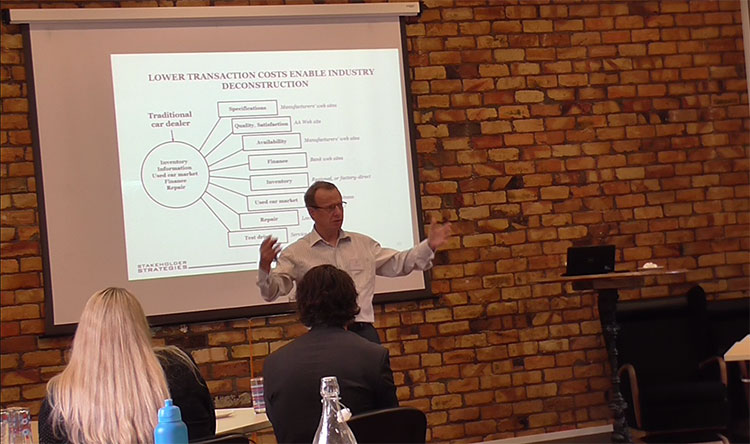A strategy is a plan to deliver success for an organisation. Successful strategies depend on high quality strategy development, which in turn requires relevant strategic planning skills
Most businesses only need to develop a strategy every few years, meaning they do not usually have widely experienced internal strategists available. Many strategies are developed in difficult circumstances, leaving the possibility that the strategy could be improved, or be challenged by important stakeholders.
A leader or leadership group may want to test their strategic thinking or explore possibilities with a thought-partner who brings practical strategy development expertise and relevant domain knowledge. Expert review of the strategy provides increased confidence that the strategy has been developed well, is well formed, and is likely to succeed.
It may also be helpful to talk through an awkward situation or difficult issue with someone whose work experience is mainly solving complex, high stakes, unfamiliar strategy problems, and advising leaders when they face the most challenging issues.
Leadership groups, usually Boards and executive teams, often have workshops or strategy days, either because an interaction is required at a particular stage of the strategy process or because a high stakes issue must be resolved. Sometimes these workshops are led by the Chair or CEO and sometimes an external facilitator is brought in, for a variety of reasons.
I am not a workshop facilitator who uses a standard process to get the best from the knowledge in the room. I bring strategy knowledge and the competence to lead a group through a programme of work to deliver the required outcomes. I engage with the content of the strategy task, not just the process.
Each workshop agenda is customised to meet the needs of the client.
The core of the effort is usually the identification and resolution of the strategy issues that face the business. The output includes agreed actions.
Strategy training workshops focus on the “how to” of strategy. They usually combine training materials which convey the principles and process of strategy development with group-work to apply the learning.
Sometimes strategy training is combined with work on a client’s strategy in a work programme that might extend over two or three days.

Rick Boven discussing industry deconstruction at a strategy training session
I only serve one commercial client in each industry. If there is any doubt about interests and potential conflicts the first client is consulted and may exercise a veto.
For avoidance of doubt, I no longer lead and manage large scale strategy projects.

Helping commercial organisations in a wide range of industries develop strategy to gain a sustainable competitive advantage, turn around under-performing businesses, increase profit, leverage innovation to penetrate international markets, manage and respond to industry evolution and disruption, and ensure organisational effectiveness.

Leveraging deep expertise in economics to help government and commercial organisations understand how to increase productivity and innovation, develop strategy for overcoming growth bottlenecks, respond to changes in regulation, measure and manage performance, and capture opportunities in pricing.

Engaging with Government, SOEs and NGOs to develop strategy that addresses social issues, identify the economic and wider benefits and costs of social interventions, improve organisational effectiveness, develop responses to high-level opportunities and threats, and facilitate long-term planning.

Guiding leaders to manage the tension between short-term growth and long-term risks, plan for and influence future scenarios, assess the future impact of environmental trends, measure the economic and other effects of environmental policy options, and understand the interactions among environmental, social and economic issues.
